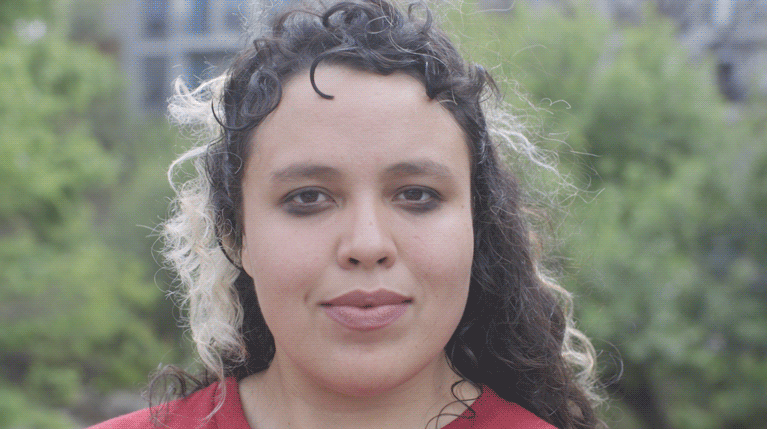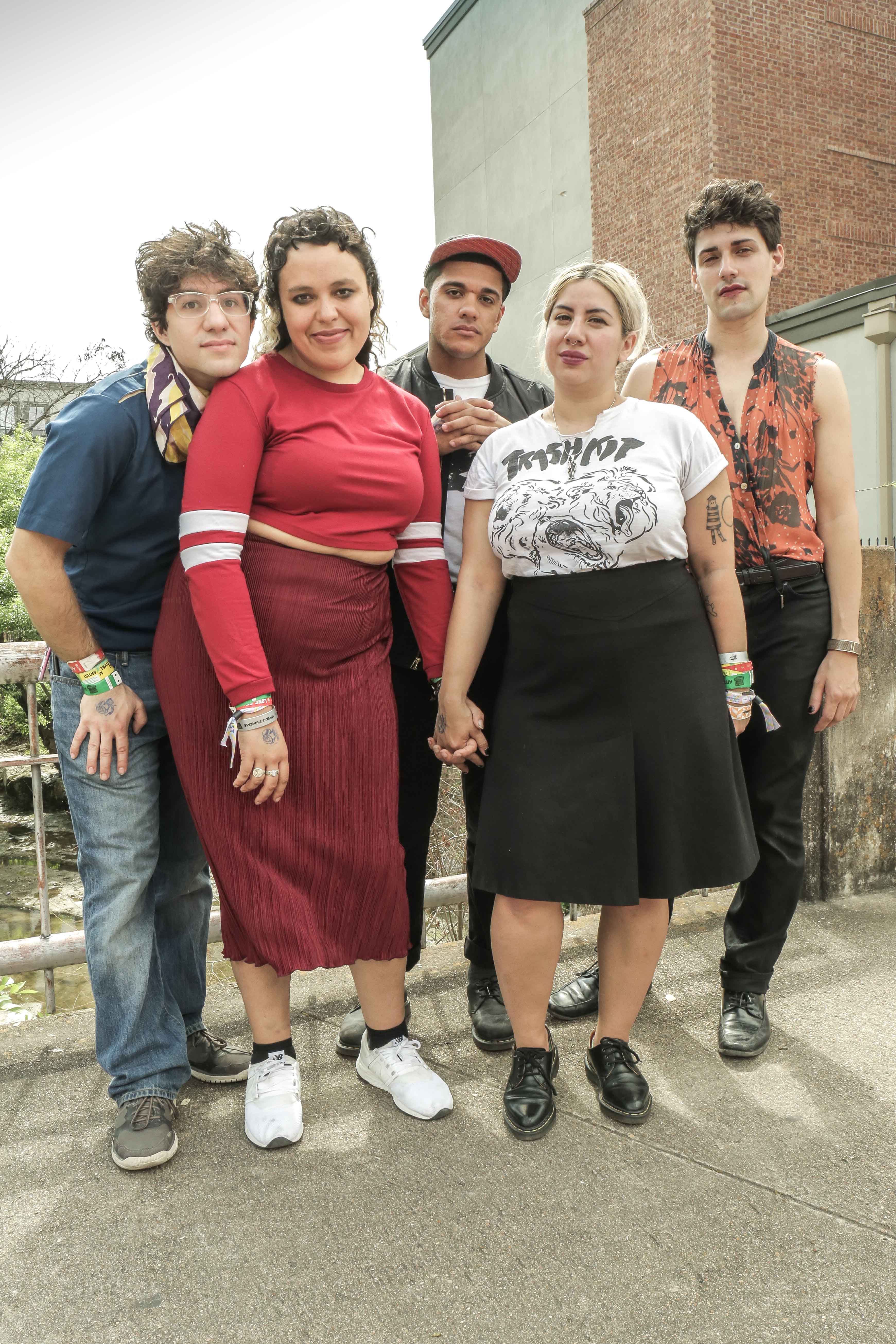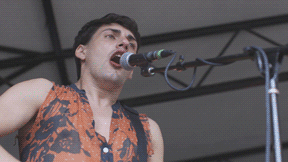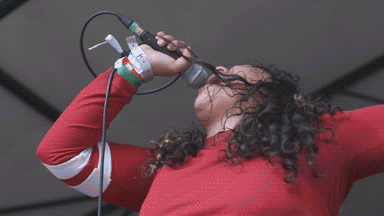Downtown Boys is a band that’s rewriting the rules of punk rock. They sing in Spanish and English, and resist relegation to any musical ghetto. They can roll with harsh and brutal riffs as comfortably as they send up synth melodies and sax solos. They draw as much from Bruce Springsteen and Selena as they do Minor Threat and Los Crudos. It makes for thrilling records and live shows, but is so resistant to classification that it’s often a challenge to get people engaging with their music to meet them halfway.
“It’s like you invited people to your party at your house and you can’t tell if they’re having fun,” says vocalist Victoria Ruiz. “It’s a mix of that feeling and also being like, ‘This isn’t on me. I’ve given you these tools and that’s as far as I can go as a musician.’ And we live in a country where mad people speak Spanish, and it’s basically a national language, so it would take you one more step to really open this up.”
It goes beyond simply making the effort to understand Ruiz’s Spanish lyrics; when you’re aggressively political, it can be difficult for people to take your lyrics at anything but face value. She says the band can’t play Full Communism cut “Tall Boys,” an aggressive screed against ego and entitlement, because most of the people who wanted to engage with the song were quite literally tall white dudes who felt attacked.
“When Pitchfork was doing our album review, it was super funny because they only wanted to know about ‘Tall Boys’ – if I actually had something against tall people or something, and how tall I was,” Ruiz says. “I think that’s what people of color — especially women of color and non-binary people of color — have had to deal with forever. We can say our truth as much as we want, and white supremacy has always read between the lines until they find exactly what they want, or they just won’t even bother listening. It’s almost like you’re talking but your volume is completely muted. That speaks to a greater issue of entitlement and privilege…Sometimes the truth just can’t — and doesn’t — set us free.”

Downtown Boys are a group of activists as much as they are a group of musicians. They met in Providence, drawn to the city’s hub of community organizing. Ruiz and guitarist Joey DeFrancesco first met at the Providence hotel they were working at, rallying employees to form a union, and got involved with the nonprofit Demand Progress, a grassroots political organization advocating for internet freedom, open government, and finance reform. They were involved early on in organizing for Providence’s recently passed “Providence Community-Police Relations Act” (formerly known as the Community Safety Act), which provides legal protections for communities plagued by police malfeasance and racial profiling. Even now, they do their best to make the most of their platform; after getting booked to play Coachella, they wrote an open letter decrying donations made to anti-LGBT groups by AEG (Coachella’s parent company) founder Philip Anschutz and pledged to donate part of their fee to LGBT rights organizations PrYSM and FIERCE.
“Sometimes the truth just can’t — and doesn’t — set us free.”
Downtown Boys emerged from a DIY punk scene that can preach inclusion but often fail to live up the ideal. And in an era of hyper urbanization, DIY music spaces are often at the vanguard of gentrifying impoverished neighborhoods, displacing poor and working-class people of color — the very people whose voices Downtown Boys seek to uplift. “Punk needs to look at itself and realize that it’s not always doing the best that it can in welcoming the people and opening spaces and making sure they involve the community that they ‘care’ about,” drummer Norlan Olivo says. In communities that have become synonymous with left-leaning politics, brown punks like Olivo and Ruiz often find such ideology fail to manifest in their reality. “In theory, if you are DIY or a punk, you’re not supposed to be racist or homophobic or anything of this nature, but that’s just not the case. The most racist people, the most people who I’ve dealt with in terms of power dynamics, the people who have fetishized me the most, are white punks.”
And that’s one of the most refreshing things about Downtown Boys: a willingness to confront that borders on revelry. They aggressively challenge their audience to confront their own complicity in maintaining the status quo, a call-to-arms against apathy. When DeFrancesco preaches against the police state or Israeli apartheid from their pulpit on stage, Ruiz will translate it into Spanish in real-time. She channels Kathleen Hanna’s “girls to the front” philosophy, but at this point, it’s often unspoken; the brown girls that come to see her have no intention of staying out of that mosh pit.
The power of such representation is hard to put into words, but for those of us who have grown up without seeing people that look like us onstage, a Downtown Boys show is a revelation. Ruiz forcefully emanates confidence and power, the kind that can turn a dark reflection of colonial demons like “Monstro” into an anthemic declaration of self-worth, with scores of kids screaming along with her: “She’s brown, she’s smart!” Ruiz is an electrifying performer, the kind of voice that fills your body with energy, validating your fear, rage, pride, and love all at once. She’s an apathy destroyer, her words imbued with the power to force people to examine their own complicity in the evils that consume us. It’s uncomfortable. It’s also essential: for every Tall Boy who can’t see beyond themselves is a white kid waking up, their eyes widening with each song.

“Complicity is part of our everyday life, and having to decide that it’s not gonna be another reason for you to hate yourself, but rather, it’s going to be motivation to fight why you hate yourself, that’s why we speak to it.” Ruiz says. “I try [to be] humble and realize my own complicity. We’re just speaking about our collective energy and our collective power. I don’t think we’re trying to create a hierarchy or we’re not trying to create a professor-student dynamic. But I think a lot of the newly woke white people, they’re still like, ‘Oh, teach me. Preach.’ It’s like, it has to be reciprocal. I think [with] Cost of Living, we’re really trying to get at that.”
“The people who have fetishized me the most, are white punks.”
Cost of Living is their latest album, second full-length and their first for beloved indie label Sub Pop. The title hints at more than just the price of goods and services; there are physical and emotional costs to survival for the victims of patriarchal white supremacy. “Promissory Note” speaks to the burden of white fragility that people of color are expected to bear; On “A Wall,” they refute the power of a physical barrier along the U.S.-Mexico border while acknowledging the myriad costs of its inception. The interlude “Heroes” is one of its more powerful moments, an excerpt of a speech by Aaron Swartz, the activist who founded Demand Progress, the organization that funds DeFrancesco and Ruiz’s SparkMag website. It promotes self-love and its ability to fuel collective power to enact real change; a powerful message that also feels tragic in the wake of Swartz’s prosecution for releasing academic documents to the public and subsequent suicide.
“Somos Chulas (No Somos Pendejas)”— a furious, defiant ripper that Olivo and bassist Mary Regalado drive in double time when they play it live — might be the album’s most memorable track. “I don’t care if you cry!” Ruiz bellows, reminding her oppressors, “I won’t light myself on fire to keep you warm!” The song’s title reclaims a label often wielded by catcalling misogynists, rebranding as a girl gang throwing up middle fingers at the patriarchy.


Musically, Cost of Living represents a maturation, in lyrical content, instrumentation, and perspective. While signing to Sub Pop didn’t necessarily provide any major difference in audio quality — Cost of Living was recorded at Steve Albini’s Electric Audio, same as Full Communism — it does benefit from a clean and wide-open mix, with Ruiz and DeFrancesco’s voices getting the biggest boost. Producer Guy Picciotto says he had Ruiz handhold the mic during vocal tracking, untethering her from the mic stand in an attempt to capture the raw energy of her live performance.
“If I get killed by the police or something, I can somehow go out saying that I was fighting.”
They still play small clubs, but they’ve also played Coachella, a booking that drew criticism from the same punks that put them on a pedestal and in a position to book those gigs in the first place. “It’s pretty crazy that punk is the one root that loves to put us on a pedestal when it’s convenient, then they try and drown us…If we play a big festival, like not DIY or die enough, we’re no longer real punks,” says Ruiz. No matter that they donated portions of their fee to the organization that birthed Providence’s Community Safety Act, or that they used their platform as featured artists at 2017’s SXSW festival to demand the removal of the deportation-related language in its artist contracts.
As they tour the country in support of their new record, Downtown Boys will no doubt find themselves playing to some audiences that are completely on board with their philosophy and practice, as well as others that may be in for a rude awakening. Olivo sees power in both preaching to the choir and galvanizing their base as well as in confronting crowds and making them uncomfortable.
“If you go to a show and you’re going to see a regular rock band, and then you go into the Downtown Boys Brown Church of Punk and you realize that your MCM having dreads isn’t the coolest thing in the world, then that’s great,” Olivo says. “I know that some people may see that as a loss, and may see it as though we’re antagonizing or too aggressive or too whatever, but I just think that if people knew what it felt like to be hit, they wouldn’t hit anybody.”
The idea of playing to a hostile crowd in the south might be scary, but belligerent security guards, racist punks, and violent cops haven’t stopped them to this point, and they have no plans to start letting them.
“People are already hating on me simply because of the color of my skin,” Olivo says. “What’s being in a political punk band gonna add to that danger? At least if I get killed by the police or something, I can somehow go out saying that I was fighting.”
Downtown Boys’ Cost of Living is out now on Sub Pop.







